- Home
- Robert B. Parker
Painted Ladies
Painted Ladies Read online
Table of Contents
Title Page
Copyright Page
Dedication
Chapter 1
Chapter 2
Chapter 3
Chapter 4
Chapter 5
Chapter 6
Chapter 7
Chapter 8
Chapter 9
Chapter 10
Chapter 11
Chapter 12
Chapter 13
Chapter 14
Chapter 15
Chapter 16
Chapter 17
Chapter 18
Chapter 19
Chapter 20
Chapter 21
Chapter 22
Chapter 23
Chapter 24
Chapter 25
Chapter 26
Chapter 27
Chapter 28
Chapter 29
Chapter 30
Chapter 31
Chapter 32
Chapter 33
Chapter 34
Chapter 35
Chapter 36
Chapter 37
Chapter 38
Chapter 39
Chapter 40
Chapter 41
Chapter 42
Chapter 43
Chapter 44
Chapter 45
Chapter 46
Chapter 47
Chapter 48
Chapter 49
Chapter 50
Chapter 51
Chapter 52
Chapter 53
Chapter 54
Chapter 55
Chapter 56
Chapter 57
Chapter 58
Chapter 59
Chapter 60
Chapter 61
Chapter 62
Chapter 63
Chapter 64
Chapter 65
Chapter 66
Chapter 67
THE SPENSER NOVELS
The Professional
Rough Weather
Now & Then
Hundred-Dollar Baby
School Days
Cold Service
Bad Business
Back Story
Widow’s Walk
Potshot
Hugger Mugger
Hush Money
Sudden Mischief
Small Vices
Chance
Thin Air
Walking Shadow
Paper Doll
Double Deuce
Pastime
Stardust
Playmates
Crimson Joy
Pale Kings and Princes
Taming a Sea-Horse
A Catskill Eagle
Valediction
The Widening Gyre
Ceremony
A Savage Place
Early Autumn
Looking for Rachel Wallace
The Judas Goat
Promised Land
Mortal Stakes
God Save the Child
The Godwulf Manuscript
THE JESSE STONE NOVELS
Split Image
Night and Day
Stranger in Paradise
High Profile
Sea Change
Stone Cold
Death in Paradise
Trouble in Paradise
Night Passage
THE SUNNY RANDALL NOVELS
Spare Change
Blue Screen
Melancholy Baby
Shrink Rap
Perish Twice
Family Honor
THE VIRGIL COLE/ EVERETT HITCH NOVELS
Blue-Eyed Devil
Brimstone
Resolution
Appaloosa
ALSO BY ROBERT B. PARKER
Double Play
Gunman’s Rhapsody
All Our Yesterdays
A Year at the Races
(with Joan H. Parker)
Perchance to Dream
Poodle Springs
(with Raymond Chandler)
Love and Glory
Wilderness
Three Weeks in Spring
(with Joan H. Parker)
Training with Weights
(with John R. Marsh)
G. P. PUTNAM’S SONS
Publishers Since 1838
Published by the Penguin Group
Penguin Group (USA) Inc., 375 Hudson Street, New York, New York 10014, USA • Penguin Group (Canada), 90 Eglinton Avenue East, Suite 700,
Toronto, Ontario M4P 2Y3, Canada (a division of Pearson Penguin Canada Inc.) • Penguin
Books Ltd, 80 Strand, London WC2R ORL, England • Penguin Ireland,
25 St Stephen’s Green, Dublin 2, Ireland (a division of Penguin Books Ltd) • Penguin
Group (Australia), 250 Camberwell Road, Camberwell, Victoria 3124, Australia
(a division of Pearson Australia Group Pty Ltd) • Penguin Books India Pvt Ltd,
11 Community Centre, Panchsheel Park, New Delhi-110 017, India • Penguin
Group (NZ), 67 Apollo Drive, Rosedale, North Shore 0632, New Zealand (a division
of Pearson New Zealand Ltd) • Penguin Books (South Africa) (Pty) Ltd,
24 Sturdee Avenue, Rosebank, Johannesburg 2196, South Africa
Penguin Books Ltd, Registered Offices: 80 Strand, London WC2R ORL, England
Copyright © 2010 by The Estate of Robert B. Parker
All rights reserved. No part of this book may be reproduced, scanned,
or distributed in any printed or electronic form without permission.
Please do not participate in or encourage piracy of copyrighted materials
in violation of the author’s rights. Purchase only authorized editions.
Published simultaneously in Canada
Library of Congress Cataloging-in-Publication Data
Parker, Robert B., 1932-2010.
Painted ladies / Robert B. Parker.
p. cm.
eISBN : 978-1-101-44387-3
1. Spenser (Fictitious character)—Fiction. 2. Private investigators—Massachusetts—
Fiction. 3. Art thefts—Investigation—Fiction. 4. Art thieves—Fiction. I. Title.
PS3566.A686P
813’.54—dc22
This is a work of fiction. Names, characters, places, and incidents either are the product of the author’s imagination or are used fictitiously, and any resemblance to actual persons, living or dead, businesses, companies, events, or locales is entirely coincidental.
While the author has made every effort to provide accurate telephone numbers and Internet addresses at the time of publication, neither the publisher nor the author assumes any responsibility for errors, or for changes that occur after publication. Further, the publisher does not have any control over and does not assume any responsibility for author or third-party websites or their content.
http://us.penguingroup.com
For Joan: live art
1
My first client of the day (and of the week, truth be known) came into my office on the Tuesday after Thanksgiving and sat in one of my client chairs. He was medium-height and slim, wearing a brown tweed suit, a blue paisley bow tie, and a look of satisfaction.
“You’re Spenser,” he said.
“Yes, I am,” I said.
“I am Dr. Ashton Prince,” he said.
He handed me a card, which I put on my desk.
“How nice,” I said.
“Excuse me?”
“What can I do for you, Dr. Prince.”
“I am confronted with a matter of extreme sensitivity,” he said.
I nodded.
“May I count on your discretion?” he said.
“Sure,” I said.
“I’m serious,” he said.
“I can
tell,” I said.
He frowned slightly. Less in disapproval than in uncertainty.
“Well,” he said, “may I?”
“Count on my discretion?”
“Yes!”
“At the moment, I don’t have anything to be discreet about,” I said. “But I would be if I did.”
He stared at me for a moment, then smiled.
“I see,” he said. “You’re attempting to be funny.”
“ ‘Attempting’?” I said.
“No matter,” Prince said. “But I need to know you are capable of taking my issues seriously.”
“I’d be in a better position to assess that,” I said, “if you told me what your issues were.”
He nodded slowly to himself.
“I was warned that you were given to self-amusement,” he said. “I guess there’s no help for it. I am a professor of art history at Walford University. And I am a forensic art consultant in matters of theft and forgery.”
And pleased about it.
“Is there such a matter before us?” I said.
He took in some air and let it out audibly.
“There is,” he said.
“And it requires discretion,” I said.
“Very much.”
“You’ll get all I can give you,” I said.
“All you can give me?”
“Anything,” I said, “that your best interest, and my self-regard, will allow.”
“Your ‘self-regard’?”
“I try not to do things that make me think ill of myself.”
“My God,” Prince said. “I mean, that’s a laudable goal, I suppose. But you are a private detective.”
“All the more reason for vigilance,” I said.
He took another deep breath. He nodded slowly.
“There is a painting,” he said, “by a seventeenth-century Dutch artist named Frans Hermenszoon.”
“Lady with a Finch,” I said.
“How on earth did you know that?” Prince said.
“Only Hermenszoon painting I’ve ever heard of.”
“He painted very few,” Prince said. “Hermenszoon died at age twenty-six.”
“Young,” I said.
“Rather,” Prince said. “But Lady with a Finch was a masterpiece. Is a masterpiece. It belongs to the Hammond Museum. And last week it was stolen.”
“Heard from the thieves?” I said.
“Yes.”
“Ransom?” I said.
“Yes.”
“And if you bring any cops in, they’ll destroy the painting,” I said.
“Yes.”
“So what do you want from me?” I said.
“The Hammond wants the whole matter handled entirely, ah, sotto voce. They have asked me to handle the exchange.”
“The money for the painting,” I said.
“Yes, and I am, frankly, uneasy. I want protection.”
“Me,” I said.
“The chief of the Walford campus police asked a friend at the Boston Police Department on my behalf, and you were recommended.”
“I’m very popular there,” I said.
“Will you do it?”
“Okay,” I said.
“Like that?” Prince said.
“Sure,” I said.
“What do you charge?”
I told him. He raised his eyebrows.
“Well,” he said. “I’m sure they will cover it.”
“The museum.”
“Yes,” he said. “And if they won’t cover it all, I’ll make up the difference out of pocket.”
“Generous,” I said.
“You’re being ironic,” he said.
“It is you I’m protecting,” I said.
“I know,” he said. “The painting, too. It is not merely a brilliant piece of art, though that would be enough. It is also the expression of a distant life, cut sadly short.”
“I’ll do my best,” I said.
“Which I’m told,” Prince said, “is considerable.”
I nodded.
“’Tis,” I said.
2
Susan and Pearl were spending the weekend with me. It was Saturday morning and the three of us were out for a mid-morning stroll in the Public Garden. Pearl was off the leash so she could dash about and annoy the pigeons, which she was doing, while Susan and I watched proudly.
“So you are going to make this exchange Monday morning?” Susan said.
“Yep.”
“How do you feel about it?” she said.
“I am, as you know, fearless.”
“Mostly,” Susan said.
“ ‘Mostly’?”
Susan smiled and shook her head.
“What’s bothering you about it?” she said.
“An exchange like this,” I said, “they gotta be sure they get the money before they give you the painting. You gotta be sure you get the painting before you give them the money. They gotta be sure that once they give up the painting the cops don’t swoop in and bust them.”
“Difficult,” Susan said.
“And their side gets to call the shots,” I said.
“Which you don’t like,” Susan said.
“Which I don’t like,” I said.
“Ducks,” Susan said. “You don’t like anyone else calling the shots on what tie to wear.”
“Except you,” I said.
Susan smiled.
“Of course,” she said. “Always except me.”
A group of pigeons was pecking at some popcorn that had been thrown on the ground for them. Pearl chased them off and ate the popcorn. A mature woman in a leopard-skin coat stood up from the bench where the pigeons had gathered and walked toward us.
“Madam,” she said, “control your dog. That popcorn is intended for the pigeons.”
Susan smiled.
“Survival of the fittest,” she said.
The woman frowned.
She said, “Don’t be flippant, young woman.”
“Yikes,” I murmured.
Susan turned slowly toward the woman.
“Oh, kiss my ass,” Susan said.
The woman took a half-step back. Her face reddened. She opened her mouth, and closed it, and turned and marched away.
“They teach you ‘kiss my ass’ at Harvard?” I said.
“No,” Susan said. “I learned that from you. . . . Pearl likes popcorn.”
“At least she called you ‘young woman,’ ”I said.
Susan was glaring after the woman.
“By her standards,” Susan said.
Suddenly Pearl stopped scavenging the popcorn and stood motionless, her ears pricked, as if she were pointing. Which she wasn’t. She was staring.
Coming toward us was a yellow Lab with a massive head and a broad chest. He was wagging his tail majestically as he trotted toward us, as if he was one hell of a dog and proud of it. He stopped about a foot in front of Pearl, and they looked at each other. They sniffed each other. They circled each other, sniffing as they went. Pearl didn’t suffer fools gladly, so I stayed close. In case. Then Pearl stretched her front paws out and dropped her chest and raised her hind end. The Lab did the same. Then Pearl rose up and tore around in a circle. The Lab went after her. The circle widened, and pretty soon the two dogs were racing around the whole of the Public Garden. Occasionally they would stop to put their heads down and tails up. Then they would race around some more. An attractive blonde woman was standing near us, watching.
“Your dog?” Susan said.
“Yes,” she said. “Otto.”
“Mine is Pearl,” Susan said. “They seem to be getting along.”
The woman smiled.
“Or would if they slowed down,” she said.
We watched as the flirtation continued. The two dogs began to roll on the ground, mouthing each other in make-believe bites, unsuccessfully trying to pin each other down with a front paw.
“Do you bring Pearl here regularly?” Otto’s mom said.
“Quite often,” Susan said.
“We’re in from New York, staying across the park.”
Otto’s mom nodded toward the Four Seasons.
“They seem so taken with each other,” she said. “Do you have a card or something? I could call you. Maybe they could meet again while we’re here?”
“Please,” Susan said. “Pearl will be thrilled.”
Susan gave her a card.
“Otto doesn’t mind that Pearl is spayed?” I said.
“Otto’s been neutered,” his mom said.
“Men!” Susan said to me. “This is love, not sex.”
“Both are nice,” I said.
The two dogs stood, panting, tails wagging, looking at each other.
“You should know,” Susan said.
3
Today, Prince had on a gray tweed suit and a polka-dot bow tie.
“We’re supposed to go west on Route Two,” he said when I got in his car. “They’ll call me on my cell phone and tell me where to go next.”
The car was an entry-level Volvo sedan, which was a little tight for me.
“Do they know I’m along?” I said.
“I told them I was bringing a friend because I was afraid to come alone,” he said.
“And?”
“They said you’d have to stay in the car and not get in the way.”
I nodded.
“Do you have a gun?” he said.
“Of course,” I said.
“Have you ever used it?” he said.
“Yes.”
“To shoot somebody?”
“Mostly I use the front sight to pick my teeth,” I said.
He smiled a little.
We drove west on Storrow along the river. It was bright today, and pretty chilly. But the boat crews were hard at it, as they would be until the river froze. To our left, we passed the former Braves Field, now a BU athletic field. The old stucco entrance was still there on Gaffney Street, and maybe vestiges of the right-field Jury Box. An elevated section of the Mass Pike ran above the railroad tracks outside of left field.
“When the Braves played there,” I said, “an outfielder named Danny Litwhiler is alleged to have hit a ball that cleared the left-field wall and landed in a freight car headed to Buffalo, thus hitting the longest measurable home run in baseball history.”

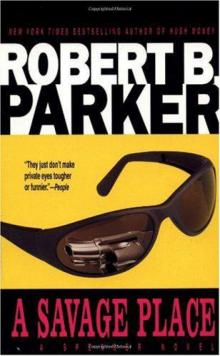 A Savage Place s-8
A Savage Place s-8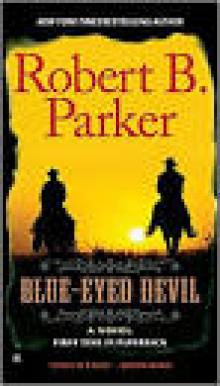 Appaloosa / Resolution / Brimstone / Blue-Eyed Devil
Appaloosa / Resolution / Brimstone / Blue-Eyed Devil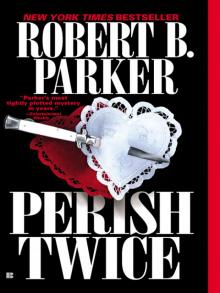 Perish Twice
Perish Twice Spare Change
Spare Change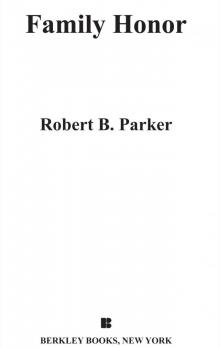 Family Honor
Family Honor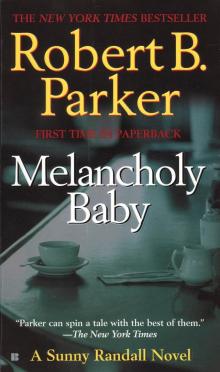 Melancholy Baby
Melancholy Baby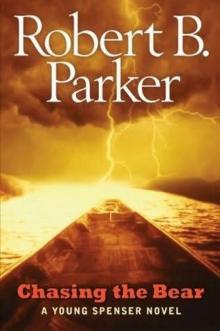 Chasing the Bear
Chasing the Bear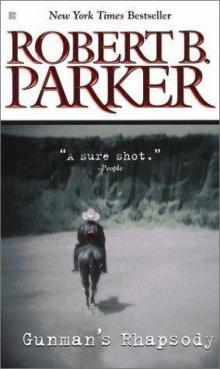 Gunman's Rhapsody
Gunman's Rhapsody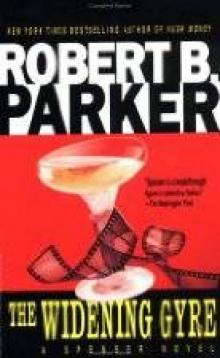 The Widening Gyre
The Widening Gyre Thin Air
Thin Air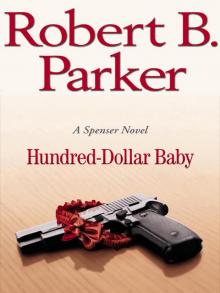 Hundred-Dollar Baby
Hundred-Dollar Baby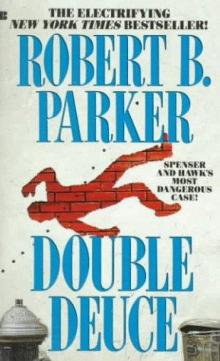 Double Deuce s-19
Double Deuce s-19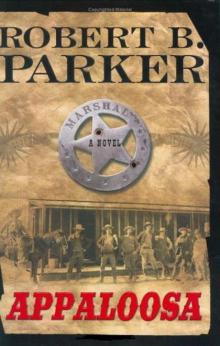 Appaloosa vcaeh-1
Appaloosa vcaeh-1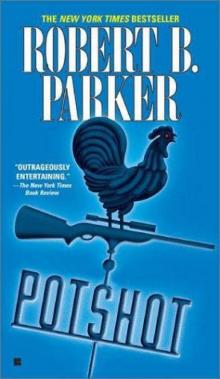 Potshot
Potshot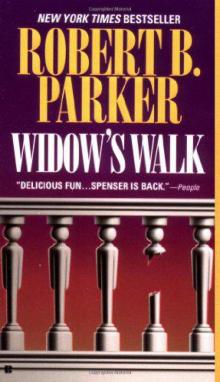 Widow’s Walk s-29
Widow’s Walk s-29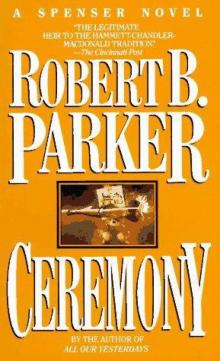 Ceremony s-9
Ceremony s-9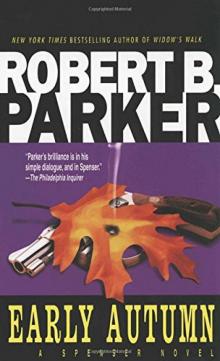 Early Autumn
Early Autumn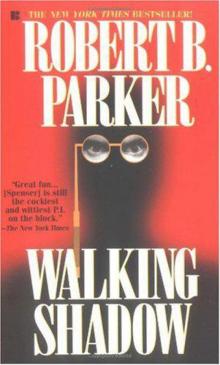 Walking Shadow s-21
Walking Shadow s-21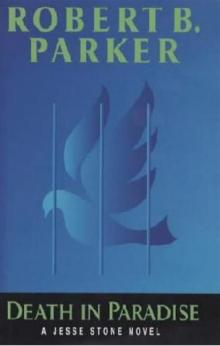 Death In Paradise js-3
Death In Paradise js-3 Shrink Rap
Shrink Rap Blue-Eyed Devil
Blue-Eyed Devil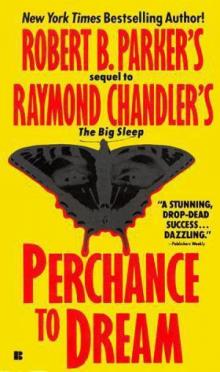 Perchance to Dream
Perchance to Dream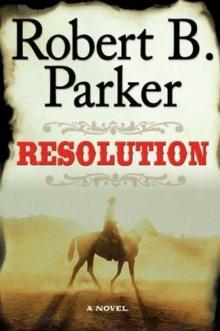 Resolution vcaeh-2
Resolution vcaeh-2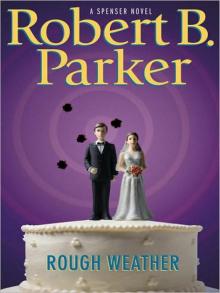 Rough Weather
Rough Weather The Jesse Stone Novels 6-9
The Jesse Stone Novels 6-9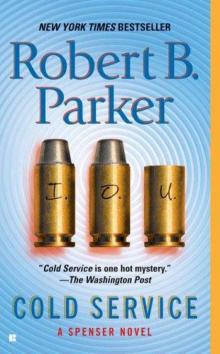 Cold Service s-32
Cold Service s-32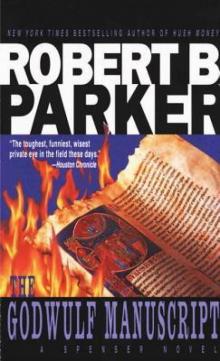 The Godwulf Manuscript
The Godwulf Manuscript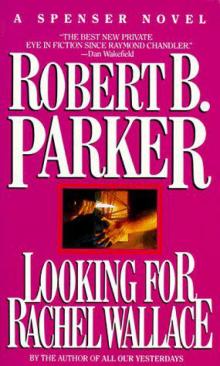 Looking for Rachel Wallace s-6
Looking for Rachel Wallace s-6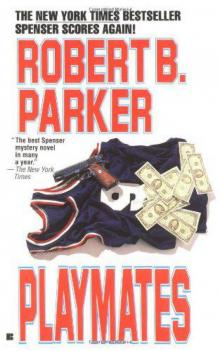 Playmates s-16
Playmates s-16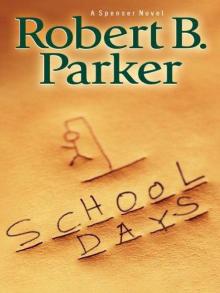 School Days s-33
School Days s-33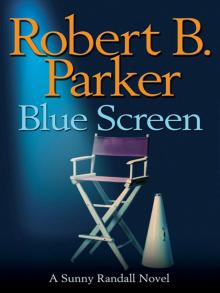 Blue Screen
Blue Screen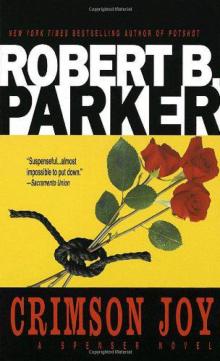 Crimson Joy
Crimson Joy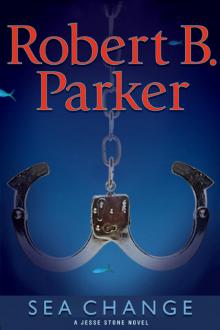 Sea Change js-5
Sea Change js-5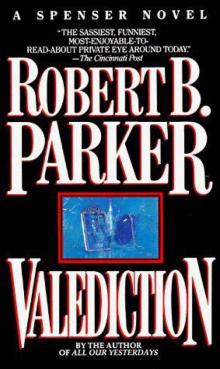 Valediction s-11
Valediction s-11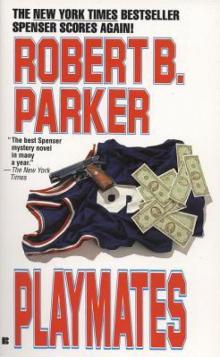 Playmates
Playmates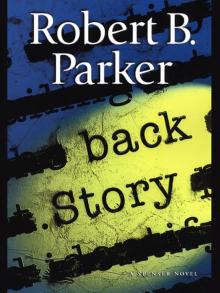 Back Story
Back Story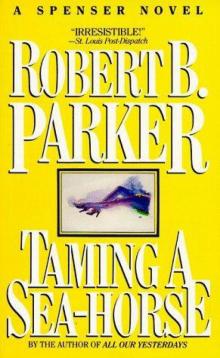 Taming a Sea Horse
Taming a Sea Horse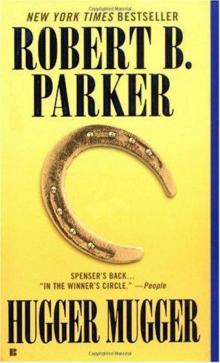 Hugger Mugger
Hugger Mugger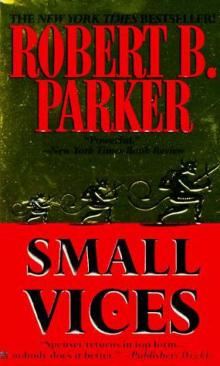 Small Vices s-24
Small Vices s-24 Silent Night: A Spenser Holiday Novel
Silent Night: A Spenser Holiday Novel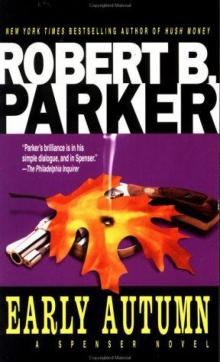 Early Autumn s-7
Early Autumn s-7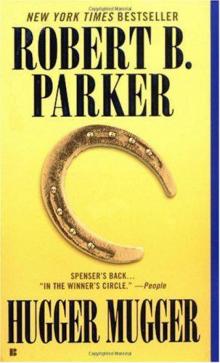 Hugger Mugger s-27
Hugger Mugger s-27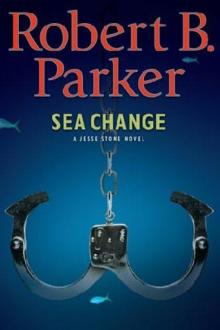 (5/10) Sea Change
(5/10) Sea Change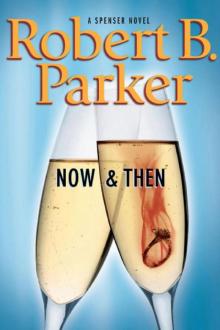 Now and Then
Now and Then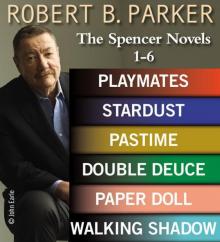 Robert B. Parker: The Spencer Novels 1?6
Robert B. Parker: The Spencer Novels 1?6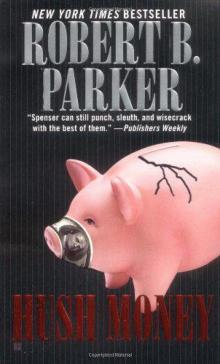 Hush Money s-26
Hush Money s-26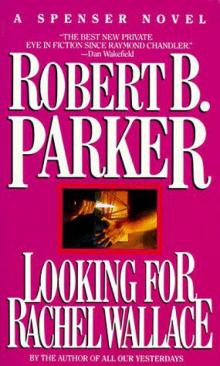 Looking for Rachel Wallace
Looking for Rachel Wallace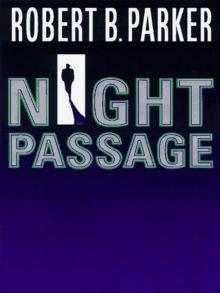 Night Passage
Night Passage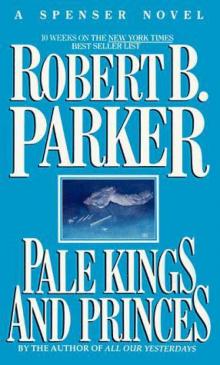 Pale Kings and Princes
Pale Kings and Princes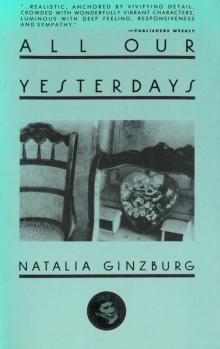 All Our Yesterdays
All Our Yesterdays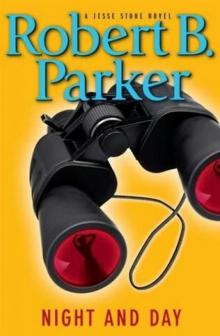 Night and Day js-8
Night and Day js-8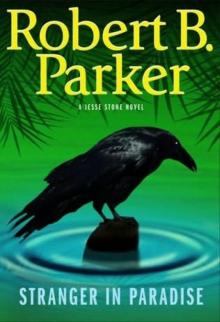 Stranger in Paradise js-7
Stranger in Paradise js-7 Double Play
Double Play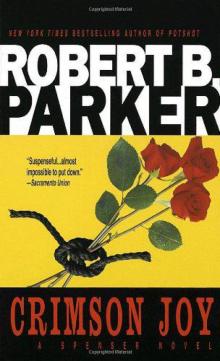 Crimson Joy s-15
Crimson Joy s-15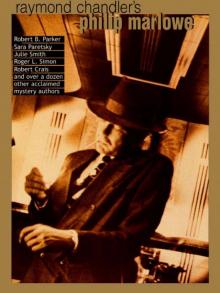 Raymond Chandler's Philip Marlowe
Raymond Chandler's Philip Marlowe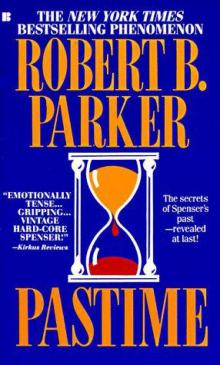 Pastime
Pastime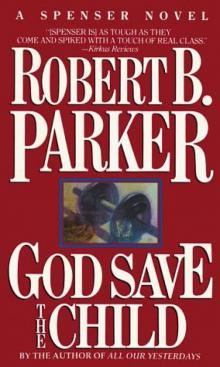 God Save the Child s-2
God Save the Child s-2 Bad Business
Bad Business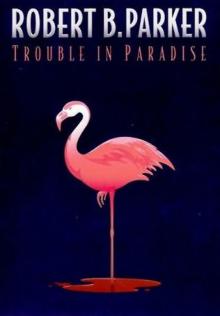 Trouble in Paradise js-2
Trouble in Paradise js-2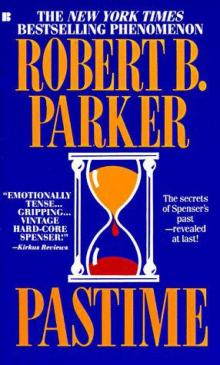 Pastime s-18
Pastime s-18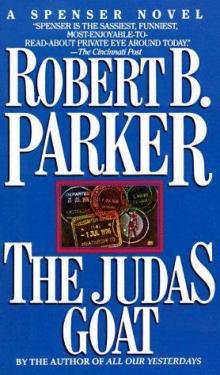 The Judas Goat s-5
The Judas Goat s-5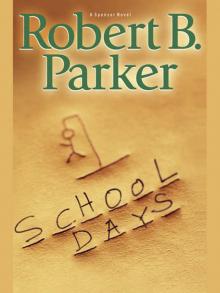 School Days
School Days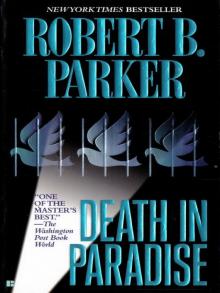 Death In Paradise
Death In Paradise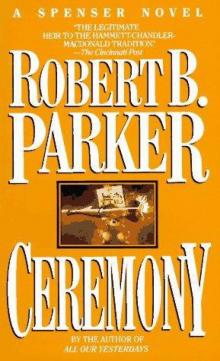 Ceremony
Ceremony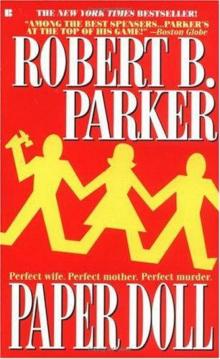 Paper Doll s-20
Paper Doll s-20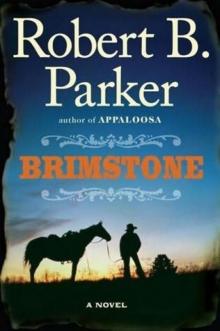 Brimstone vcaeh-3
Brimstone vcaeh-3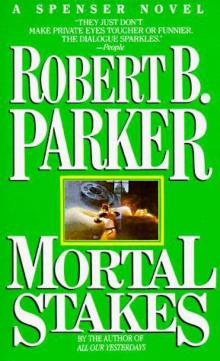 Mortal Stakes s-3
Mortal Stakes s-3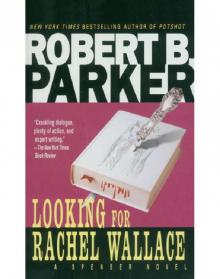 Spencer 06 - Looking for Rachel Wallace
Spencer 06 - Looking for Rachel Wallace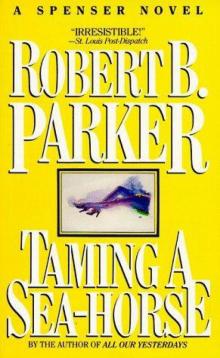 Taming a Sea Horse s-13
Taming a Sea Horse s-13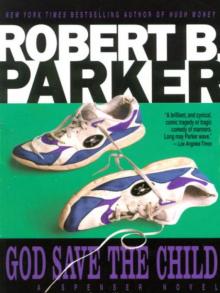 God Save the Child
God Save the Child Chance
Chance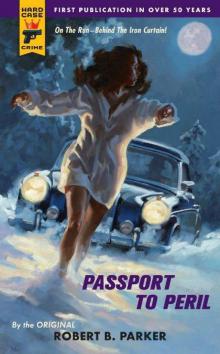 Passport To Peril hcc-57
Passport To Peril hcc-57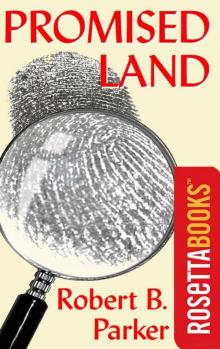 Promised Land
Promised Land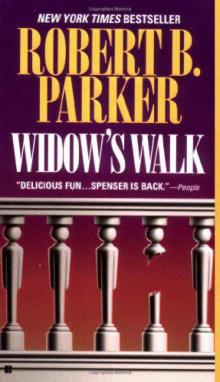 Widow’s Walk
Widow’s Walk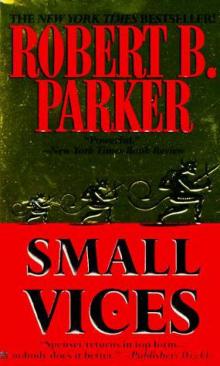 Small Vices
Small Vices Robert B Parker: The Jesse Stone Novels 1-5
Robert B Parker: The Jesse Stone Novels 1-5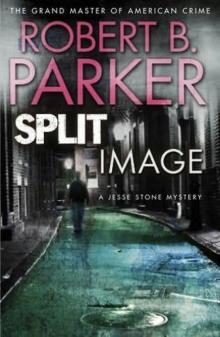 Split Image js-9
Split Image js-9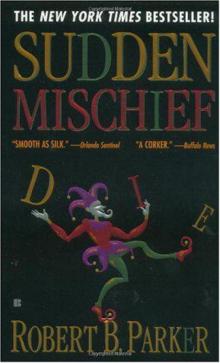 Sudden Mischief s-25
Sudden Mischief s-25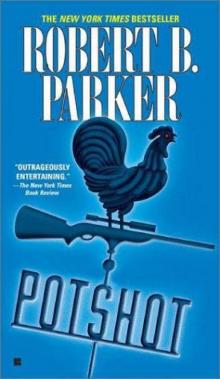 Potshot s-28
Potshot s-28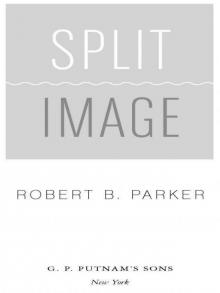 Split Image
Split Image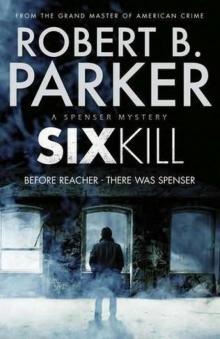 Sixkill s-40
Sixkill s-40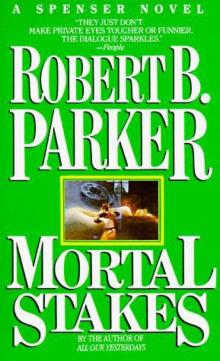 Mortal Stakes
Mortal Stakes Stardust
Stardust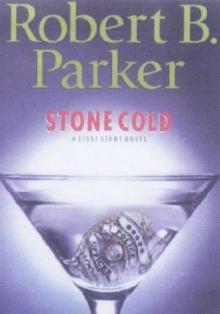 Stone Cold js-4
Stone Cold js-4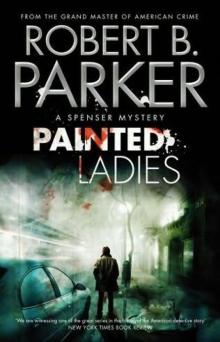 Painted Ladies s-39
Painted Ladies s-39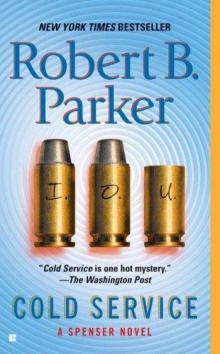 Cold Service
Cold Service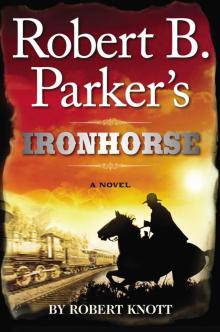 Ironhorse
Ironhorse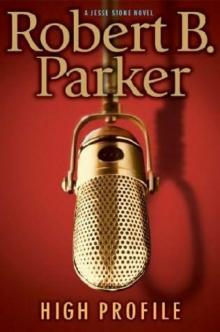 High Profile js-6
High Profile js-6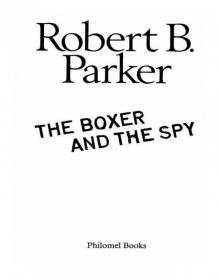 The Boxer and the Spy
The Boxer and the Spy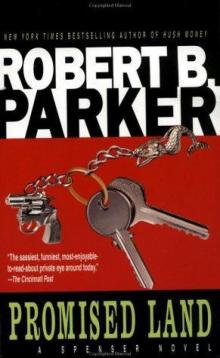 Promised Land s-4
Promised Land s-4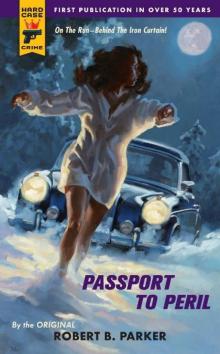 Passport to Peril (Hard Case Crime (Mass Market Paperback))
Passport to Peril (Hard Case Crime (Mass Market Paperback))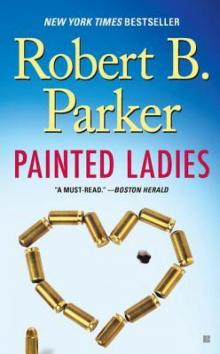 Painted Ladies
Painted Ladies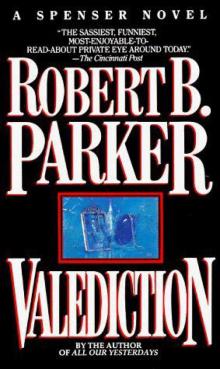 Valediction
Valediction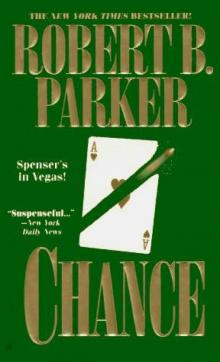 Chance s-23
Chance s-23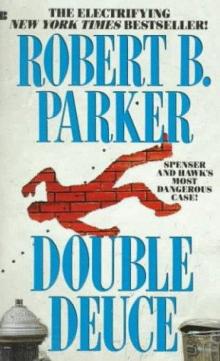 Double Deuce
Double Deuce Wilderness
Wilderness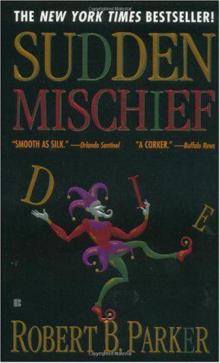 Sudden Mischief
Sudden Mischief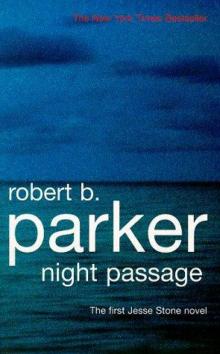 Night Passage js-1
Night Passage js-1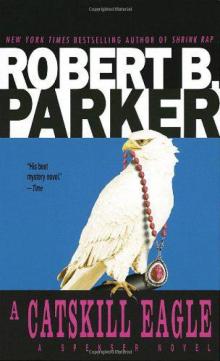 A Catskill Eagle
A Catskill Eagle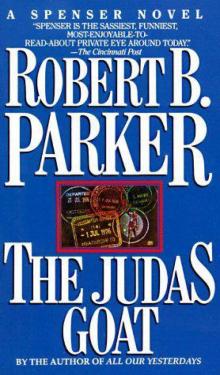 The Judas Goat
The Judas Goat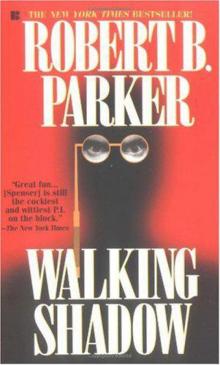 Walking Shadow
Walking Shadow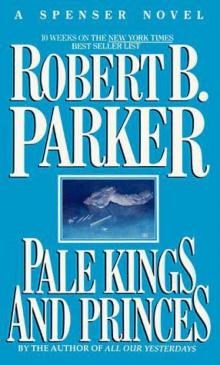 Pale Kings and Princes s-14
Pale Kings and Princes s-14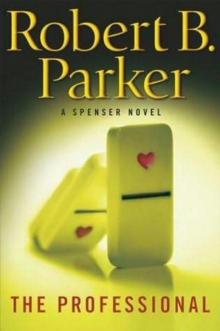 The Professional
The Professional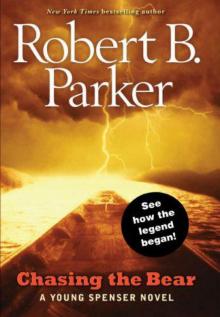 Chasing the Bear s-37
Chasing the Bear s-37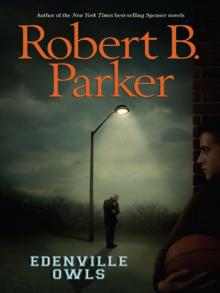 Edenville Owls
Edenville Owls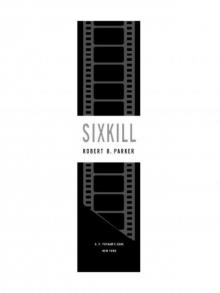 Sixkill
Sixkill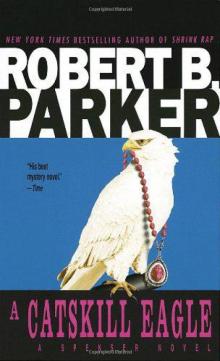 A Catskill Eagle s-12
A Catskill Eagle s-12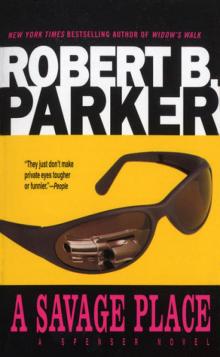 A Savage Place
A Savage Place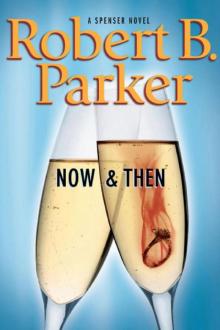 Now and Then s-35
Now and Then s-35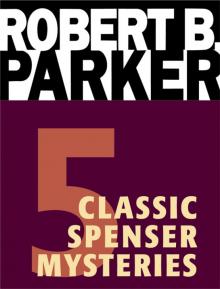 Five Classic Spenser Mysteries
Five Classic Spenser Mysteries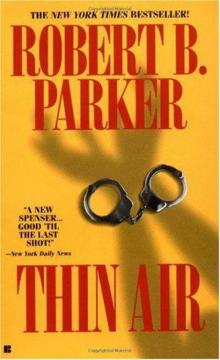 Thin Air s-22
Thin Air s-22